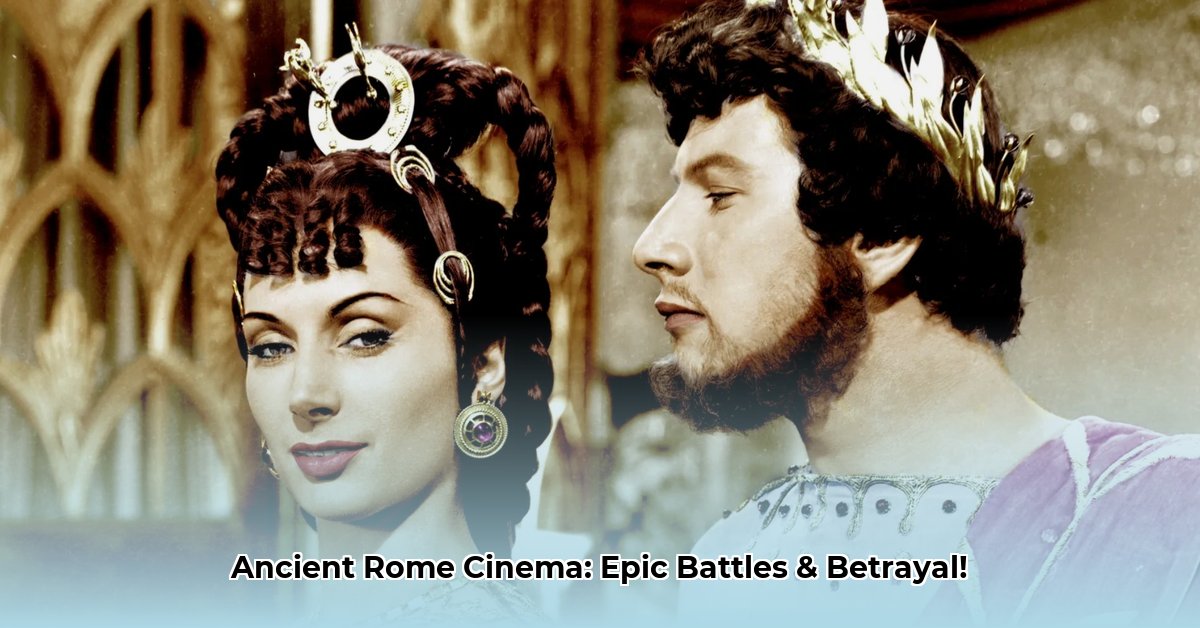From the grandeur of the Colosseum to the intricate web of senatorial intrigue, the saga of Ancient Rome has inexorably captivated the imaginations of filmmakers and audiences worldwide. This monumental epoch, brimming with tales of formidable emperors, valiant gladiators, brutal conquests, and profound betrayals, consistently forms the bedrock of some of cinema’s most compelling narratives. While the “sword and sandal” genre has evolved significantly over decades, its core fascination with power, human ambition, and societal collapse remains undiminished. This comprehensive guide delves into the most iconic cinematic interpretations of Roman life, dissecting their historical fidelity, enduring themes, and lasting impact on popular culture.
The Pantheon of Roman Epics: A Journey Through Time
The allure of Ancient Rome translates powerfully to the silver screen, offering a window into a civilization that shaped the Western world. Whether depicting the Republic’s tumultuous end or the Empire’s sprawling dominion, these films provide both spectacular entertainment and thought-provoking insights. This curated collection highlights pivotal Roman cinematic adaptations that define their era and continue to resonate with viewers today.
Gladiator (2000): The Arena’s Enduring Roar
Ridley Scott’s Gladiator single-handedly reignited the dormant Roman epic genre with its visceral action and compelling narrative. Starring Russell Crowe as Maximus Decimus Meridius, a loyal general betrayed by the ruthless Commodus, the film charts his relentless quest for vengeance in the gladiatorial arenas of Rome. While a masterclass in modern filmmaking with its breathtaking visuals and intense combat sequences, Gladiator takes significant dramatic liberties with historical accuracy; for instance, the real Commodus possessed a far less honorable character and met a different fate. Nevertheless, Crowe’s powerful performance and the film’s immersive depiction of Roman spectacle cemented its status as a timeless action-drama and a benchmark for contemporary gladiator movies.
Ben-Hur (1959): A Monument to Grandeur and Faith
Few ancient history cinema productions command the reverence of William Wyler’s Ben-Hur. Charlton Heston delivers an iconic performance as Judah Ben-Hur, a Jewish prince enduring betrayal and enslavement, whose journey culminates in an epic chariot race—a cinematic masterpiece of unparalleled scale and execution. This monumental Hollywood Roman film redefined epic filmmaking, earning an unprecedented 11 Academy Awards. While simplifying certain historical nuances for dramatic effect, its themes of human resilience, faith, and the pursuit of justice remain universally impactful. Ben-Hur is essential viewing for its unparalleled spectacle and its profound exploration of personal redemption against a backdrop of imperial power.
Spartacus (1960): The Spirit of Rebellion
Stanley Kubrick’s Spartacus boldly chronicles the legendary slave revolt led by the titular gladiator, brilliantly portrayed by Kirk Douglas. The film foregrounds timeless themes of freedom, defiance, and the brutal cost of rebellion, ensuring its surprising contemporary relevance. Featuring a formidable cast including Laurence Olivier as the ambitious Crassus, Spartacus excels in its portrayal of Roman brutality and the human struggle for dignity. While the film dramatizes aspects of Spartacus’s character and the revolt’s complexities, its powerful message and impressive battle scenes resonate deeply. For enthusiasts of compelling historical dramas focusing on human liberation, Spartacus offers a poignant and unforgettable experience.
Cleopatra (1963): The Queen of Nile’s Roman Dance
Joseph L. Mankiewicz’s Cleopatra remains one of cinema’s most opulent and famously troubled productions, yet it delivers an unforgettable spectacle. Elizabeth Taylor embodies the legendary Egyptian queen, navigating tumultuous relationships with Julius Caesar and Mark Antony amidst the intricate political intrigue of the Roman Empire. The film is a visual feast, boasting lavish sets, intricate costumes, and a star-studded cast. However, Cleopatra prioritizes romantic drama and breathtaking pageantry over strict Roman history, offering a fictionalized, albeit fascinating, glimpse into a chaotic era. It stands as a testament to classic Hollywood grandeur and the enduring allure of its iconic leading lady.
The Fall of the Roman Empire (1964): Seeds of Decline
Anthony Mann’s The Fall of the Roman Empire serves as a crucial precursor to later epics like Gladiator, exploring the internal weaknesses that led to Rome’s eventual decline. Starring Sophia Loren, Stephen Boyd, and Alec Guinness as the philosopher-emperor Marcus Aurelius, the film intricately depicts imperial corruption, moral decay, and political maneuvering during the Commodus era. While not depicting the literal “fall” of the empire, it vividly portrays the seeds of its destruction. The film’s strengths lie in its sweeping scope, impressive production design, and a nuanced exploration of leadership. History enthusiasts will appreciate its detailed portrayal of the imperial court, even if its narrative, like many epics, condenses historical timelines for dramatic impact.
Quo Vadis (1951): Faith Under Fire
Mervyn LeRoy’s Quo Vadis is a quintessential “peplum” epic that delves into the persecution of early Christians under Emperor Nero’s tyrannical rule. Starring Robert Taylor as a Roman commander who falls for a Christian woman (Deborah Kerr), the film vividly portrays the clash between pagan Rome and the burgeoning new faith. Peter Ustinov’s unhinged portrayal of Nero is a cinematic highlight, capturing the emperor’s infamous madness. Renowned for its massive sets, thousands of extras, and intense sequence of Rome burning, Quo Vadis became a blueprint for subsequent biblical epics. Though its historical accuracy is simplified for its religious narrative, it remains a powerful testament to the enduring human spirit in the face of immense oppression.
Life of Brian (1979): An Absurdist Roman Comedy
For an irreverent and brilliantly subversive take on the Roman era, Monty Python’s Life of Brian stands as a comedic masterpiece. Set in Judea under Roman occupation, this sharp-witted satire lampoons religious fervor, political bureaucracy, and the absurdities of human nature with characteristic Pythonian genius. While its primary goal is humor, not historical accuracy in film, it offers a surprisingly insightful, albeit disrespectful, commentary on mass movements and leadership. Its unique blend of slapstick, wordplay, and cutting social commentary makes it a cult classic. Life of Brian is a must-see for anyone who appreciates brilliant irreverent comedy and a refreshingly different lens on ancient times.
Titus (1999): A Tragedy Reimagined
Julie Taymor’s Titus offers a strikingly brutal and visually distinct adaptation of Shakespeare’s darkest tragedy, Titus Andronicus. Starring the formidable Sir Anthony Hopkins in the titular role, the film boldly merges ancient Roman aesthetics with jarringly modern elements—from motorcycles to microphones—creating a uniquely unsettling and visually arresting atmosphere. This unconventional approach results in a stylized, almost avant-garde Roman Empire film that challenges traditional genre norms. Its extreme violence and dark subject matter make it unsuitable for all audiences, and its experimental nature might alienate some mainstream viewers. Nonetheless, for those seeking a powerful Hopkins performance and a provocative, visually stylized interpretation of classic tragedy, Titus is a compelling cult classic worth exploring.
Agora (2009): Philosophy and Upheaval in Roman Egypt
Alejandro Amenábar’s Agora offers a distinct and often overlooked perspective on the Roman world, focusing not on imperial conquest but on intellectual pursuit and religious conflict in 4th-century Alexandria. Rachel Weisz stars as Hypatia, a brilliant female philosopher and astronomer whose scientific inquiries clash with rising Christian fundamentalism. The film beautifully portrays the intellectual ferment of the age while unflinchingly depicting the violent consequences of ideological strife. Agora stands out for its unique blend of historical drama and scientific exploration, providing a rare glimpse into the intellectual life of the Roman Empire’s later period. Weisz’s magnetic performance anchors this powerful and often heartbreaking story.
Centurion (2010): Gritty Frontier Warfare
Neil Marshall’s Centurion offers a raw, brutal, and less romanticized portrayal of Roman military life, particularly on the Empire’s untamed frontiers. Inspired by the mystery of the Lost Ninth Legion in Caledonia (modern-day Scotland), the film follows a small group of Roman soldiers, led by Michael Fassbender, fighting for survival behind enemy lines after their legion is ambushed by Pict warriors. The film emphasizes visceral combat, survival horror, and the harsh realities of guerrilla warfare, contrasting sharply with the grandeur often seen in other Roman epics. For those seeking a grittier, more action-focused Roman military film that highlights the Empire’s constant struggle against rebellious native tribes, Centurion delivers a punishing yet thrilling experience.
Enduring Narratives: Themes That Transcend Eras
The perennial appeal of Roman history movies extends far beyond their undeniable grand spectacle and epic battle scenes. These films consistently delve into universal themes that resonate deeply with audiences across generations. Ideas such as the intoxicating nature of power, the corrosive effects of corruption, the complexities of unwavering loyalty, and the devastating impact of betrayal are central to the Roman narrative. We witness the dramatic rise and inevitable decline of empires, the clash of diverse cultures, and the enduring strength of faith and individual will against overwhelming odds. These profound ideas tap into timeless human struggles, rendering these films relevant even when their historical accuracy is subject to scholarly debate. This potent blend of epic scale and profound human drama keeps us continually enthralled.
The Dynamic Evolution of Roman Cinema
From the majestic grandeur of early Hollywood epics, characterized by their “peplum” style and focus on heroic portrayals and elaborate practical sets, to the grittier, more character-driven and psychologically complex interpretations of recent decades, Roman-themed movies have undergone a significant transformation. Early classic Roman films often glorified imperial might and individual heroism, while contemporary Roman cinematic adaptations frequently explore the darker, more nuanced facets of Roman society, including the lives of slaves, common soldiers, and marginalized figures. Despite these evolving stylistic approaches and varying degrees of historical fidelity, one constant remains: these films persistently capture our collective interest in the momentous Roman Empire, cementing its indelible place in ancient Rome in pop culture.
Ultimately, films about Ancient Rome offer a captivating, if often dramatized, window into a fascinating, bygone era. They may occasionally sacrifice historical accuracy for dramatic flair, but their power to entertain, provoke thought, and explore universal human themes is undeniable. So, whether you crave visceral gladiator movie action, sweeping historical drama, an intellectual journey through antiquity, or even a satirical chuckle, these magnificent Roman epics provide ample cinematic exploration. Dive in, immerse yourself in these films, and decide which Roman Empire film truly captures the essence of this timeless civilization for you.










